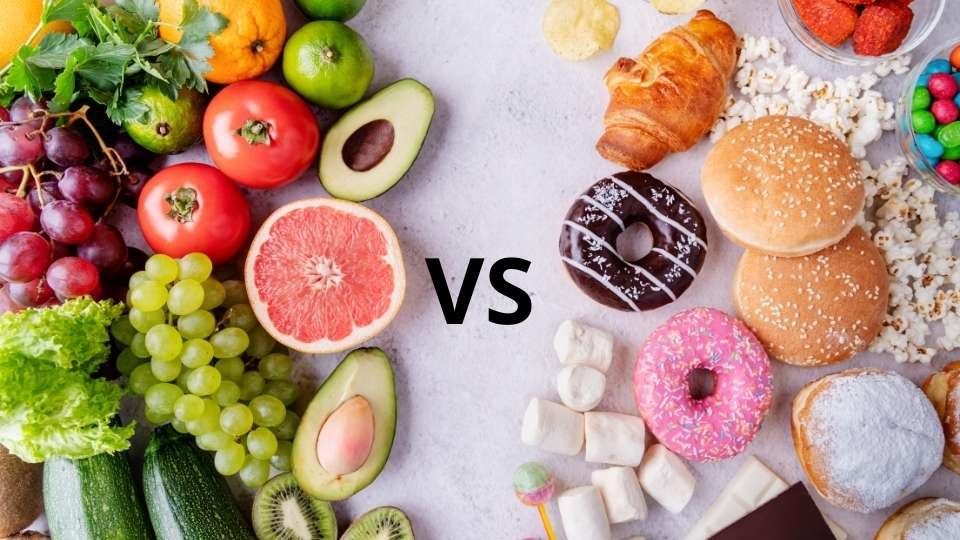Healthy Food vs Junk Food

In today’s fast-paced world, the food choices we make daily can significantly impact our overall well-being. One of the most talked-about comparisons in nutrition is healthy food vs junk food. Both types of food serve different purposes, but one clearly offers better long-term benefits. So, what sets them apart—and why should you care?
Whether you’re trying to lose weight, boost energy, or simply live a healthier life, understanding the differences between these two types of food is key.
What Is Healthy Food?
Healthy food includes natural, whole, and minimally processed items packed with essential nutrients. These foods provide your body with energy, support immune function, and help prevent diseases.
Common Examples of Healthy Food:
- Fresh fruits and vegetables (like apples, carrots, spinach)
- Whole grains (such as oats, brown rice, quinoa)
- Lean proteins (chicken, tofu, fish, eggs)
- Healthy fats (avocados, nuts, seeds, olive oil)
- Legumes and beans (lentils, chickpeas, black beans)
These foods are rich in fiber, antioxidants, vitamins, minerals, and healthy fats, which help the body function at its best.
What Is Junk Food?
Junk food refers to highly processed foods that are low in nutrients but high in sugar, salt, and unhealthy fats. They are designed to be convenient and satisfying, but often at the cost of health.
Common Examples of Junk Food:
- Sugary snacks (cookies, candy, chocolate bars)
- Fried fast food (burgers, fries, nuggets)
- Processed snacks (chips, instant noodles, crackers)
- Soda and sugary drinks
- Packaged baked goods (muffins, donuts, pastries)
While junk food might taste great in the moment, regular consumption can lead to serious health problems over time.
Nutritional Comparison: Healthy Food vs Junk Food
| Nutrient/Aspect | Healthy Food | Junk Food |
| Calories | Balanced | Often Excessive |
| Nutrient Density | High | Low |
| Fiber | Abundant | Minimal |
| Sugar | Natural (from fruits) | Refined and added |
| Fats | Healthy fats (omega-3, unsaturated) | Trans fats, saturated fats |
| Additives | Rare | Common (preservatives, artificial colors) |
Healthy food nourishes your body. Junk food may satisfy cravings, but it lacks essential nutrients.
Health Effects of Eating Healthy Food
Choosing a healthy diet regularly has proven long-term benefits:
- Boosts immunity and helps the body fight infections.
- Maintains healthy weight through natural appetite control.
- Reduces risk of heart disease, diabetes, and cancer.
- Improves mental health, memory, and concentration.
- Supports digestion with fiber-rich foods.
In short, a diet rich in whole, nutritious foods promotes longevity and vitality.
Negative Effects of Junk Food on Your Body
Frequent consumption of junk food may cause:
- Weight gain and obesity
- High cholesterol and heart disease
- Type 2 diabetes
- Digestive issues and constipation
- Increased risk of depression and anxiety
Junk food can also be addictive, leading to poor eating habits and long-term health damage.
Why Is Junk Food So Tempting?
Junk food is everywhere. It’s affordable, tasty, and incredibly convenient. But there’s more to it: these foods are scientifically designed to trigger dopamine—the brain’s “feel-good” hormone—making them addictive.
That’s why it’s so hard to eat just one chip or stop at a single cookie. But the short-term pleasure often leads to long-term health problems.
Is Healthy Food More Expensive?
Not necessarily. While some health foods like chia seeds or almond butter might cost more, there are plenty of affordable healthy food options, such as:
- Bananas, apples, and carrots
- Brown rice, oats, and whole wheat bread
- Eggs, lentils, and canned beans
- Frozen vegetables
Cooking at home and buying in bulk can make healthy eating budget-friendly. Plus, you save on future medical costs by staying healthier.
Healthy Food vs Junk Food for Weight Loss
If you’re trying to lose weight, focusing on nutrient-dense, low-calorie foods is key. Healthy food helps you feel full longer and supports fat loss without sacrificing nutrition.
Junk food, on the other hand, leads to calorie overload, especially from sugar and unhealthy fats, which can quickly sabotage your weight loss goals.
How to Shift from Junk Food to Healthy Eating
Making the switch doesn’t have to be hard. Here are some practical tips:
- Plan your meals: Meal prepping helps you avoid last-minute junk food cravings.
- Stay hydrated: Drink water regularly; thirst is often mistaken for hunger.
- Stock your kitchen with healthy snacks: Keep fruits, yogurt, and nuts handy.
- Eat mindfully: Slow down, chew thoroughly, and enjoy your food.
- Start with small changes: Swap soda for sparkling water, or fries for baked sweet potatoes.
Final Thoughts: Healthy Food vs Junk Food
The battle between healthy food vs junk food isn’t about being perfect. It’s about making better choices more often. Healthy food fuels your body, improves your mood, and helps you live a longer, fuller life. Junk food might be tempting, but over time, it robs your body of energy and well-being.
You don’t have to give up your favorite treats forever. Just aim for balance. Let healthy food be your foundation, and enjoy junk food in moderation.
Your body deserves the best—start feeding it like it matters, because it does.
